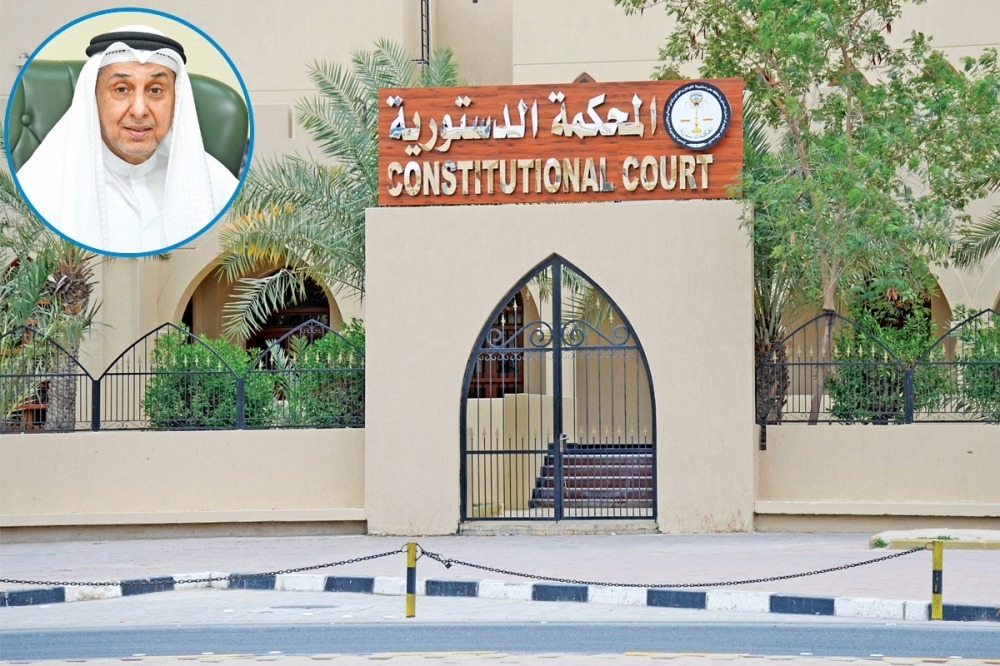Ex-Constitutional Court chief calls for independent court in Kuwait
Counselor Mohamed Bin Naji stated that the founding law of the court places it in a subordinate position, hindering it from achieving the genuine independence that all constitutional courts around the world should have.

• Given the importance of the court, the political and legal impact of their judgments, and the significance of the principles they establish, it is impossible for judges to manage the substantial workload of ordinary courts while also dedicating adequate attention to constitutional provisions, said Counselor Mohamed Bin Naji, former President of the Constitutional Court.
Counselor Mohamed Bin Naji, former President of the Constitutional Court, emphasized that the Constitutional Court is among the highest courts in the State of Kuwait, if not the highest. However, he noted that its founding law renders it subordinate and prevents it from enjoying the true independence that all constitutional courts should possess globally, according to Al Jarida newspaper.
Governments and councils of a former nation have submitted multiple draft laws for an independent constitutional court, but none have been completed for introduction and approval.
In a judicial study published by the newspaper, Bin Najistated that the Kuwaiti Constitution was issued on November 11, 1962—approximately 62 years ago—asserting that most of those years have seen ideal implementation and adherence to its principles.
He explained that Article 173 stipulates, “The law appoints the judicial authority competent to adjudicate disputes related to the constitutionality of laws and regulations and defines its powers and procedures. The law guarantees both the government and stakeholders the right to challenge the constitutionality of laws and regulations. If the said entity determines that a law or regulation is unconstitutional, it shall be considered as if it were not.”
The members of the “Constitutional” Commission are entrusted with this responsibility and work full-time, despite its significant political and legal impact.
He added, “Indeed, in 1973, Law No. 14/1973 was issued to establish a constitutional court that specified its formation, terms of reference, and method of operation. However, due to this structure, the court, which is one of the highest courts in the judiciary of the State of Kuwait—if not the highest—has become dependent and does not enjoy the actual independence that all constitutional courts in the world should possess.
This is evident as the judges serving on the court are seconded, in addition to their original roles in their respective courts, which are their primary responsibilities.
Given the importance of the court, the political and legal impact of their judgments, and the significance of the principles they establish, it is impossible for judges to manage the substantial workload of ordinary courts while also dedicating adequate attention to constitutional provisions. Their focus on the Constitutional Court is inevitably secondary, leaving them to only benefit from the material and moral privileges it offers. The overwhelming workload of the ordinary courts distracts judges from constitutional judgments.
He continued, “I do not underestimate the contributions of both former and current judges of the Constitutional Court, of which I am a member. They have inscribed provisions and principles in gold letters that are landmarks in the history of the Kuwaiti judiciary, recognized far and wide, and have become a reference for many researchers, specialists, and constitutional courts in other countries, serving as a constitutional roadmap for the executive and legislative authorities in Kuwait.”
“We are confident that the new covenant to save Kuwait and renew its course will provide the court with an independent judicial cadre,” he said.
He added, “I am sure that this commitment to excellence for this court will continue and will not cease. It was also noted that the government and former national councils have submitted multiple draft laws for an independent constitutional court, none of which have been completed or presented for approval. In many of the responses to the proposals submitted to the Supreme Council of the Judiciary for its opinion, the only objection raised was regarding the composition of the court, as it included members from outside the judiciary. However, there was no objection to the court being an independent entity.
He expressed his belief that “the New Covenant—the era of saving Kuwait, renewing its course, and accelerating its launch—will work to change and modify the current hybrid situation of the Constitutional Court and grant it the independence it deserves along with its judicial staff.”












